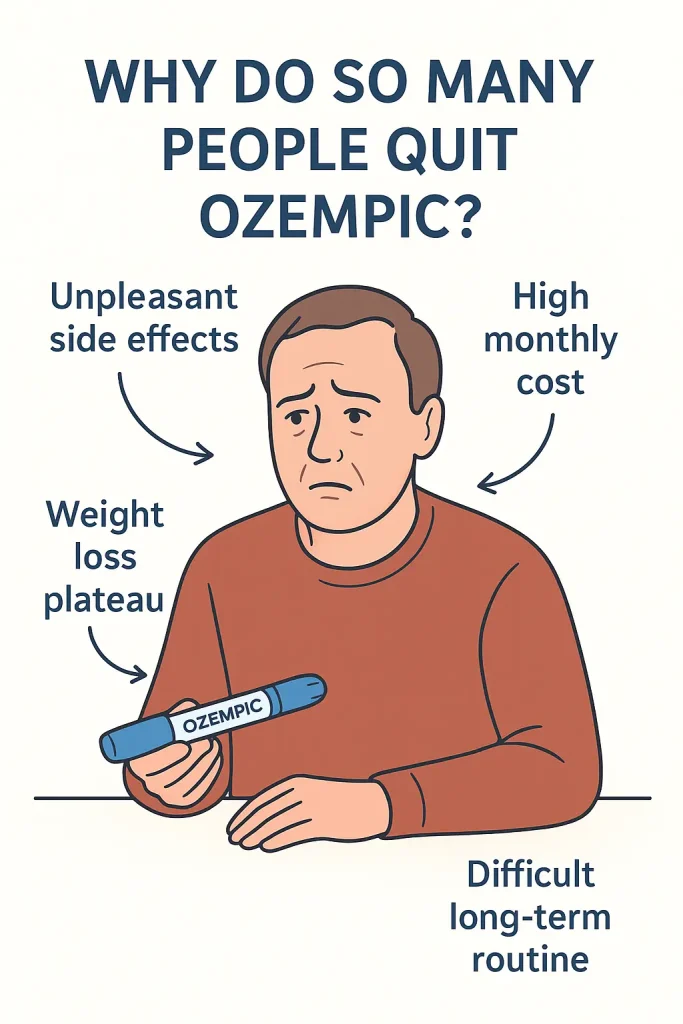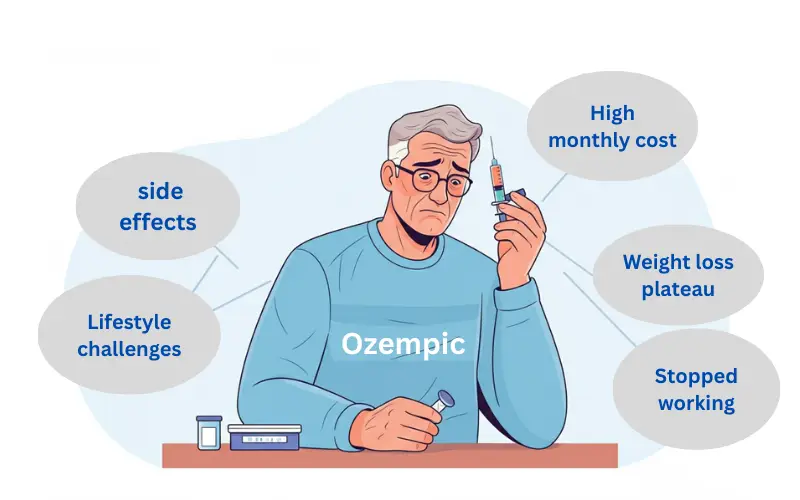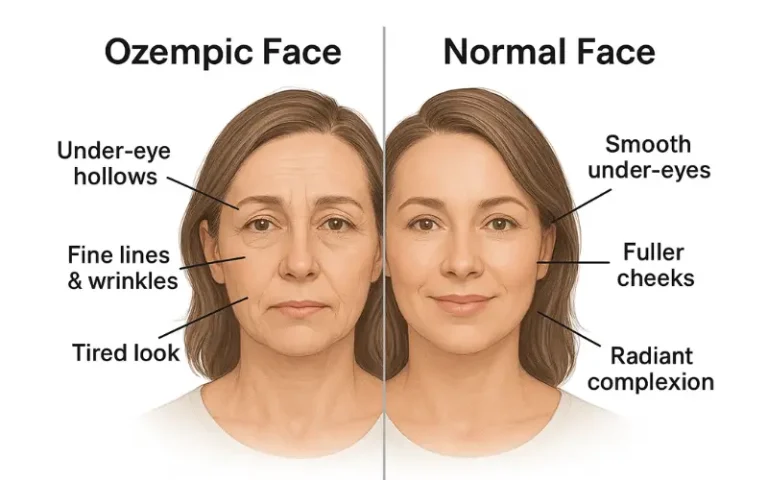Why People Quit Ozempic: A look at the top Reasons
Why Do So Many People Quit Ozempic? Why Do So Many People Quit Ozempic? Exploring the Real Reasons

Ozempic has become a household name, celebrated for its effectiveness in managing type 2 diabetes and aiding significant weight loss. As a GLP-1 receptor agonist, it has provided a new tool for many on their health journey. Yet, recent data reveal a surprising trend: a large number of users, nearly two-thirds in some studies, stop taking the medication within a year.
This raises an important question, if it works so well, why do so many people quit Ozempic? The answer is not a single issue but a mix of physical, financial, and psychological factors. This article explores the primary reasons behind this high discontinuation rate, offering a clearer picture of the real world challenges users face.
The Staggering Cost of Treatment
One of the most significant barriers to staying on Ozempic is its price. Without insurance coverage, the monthly cost can easily exceed $1,000. While many insurance plans cover GLP-1 medications for type 2 diabetes, coverage for weight loss is far less common.
This financial burden is often unsustainable. A study published in JAMA Network Open found that individuals with lower incomes were more likely to discontinue the medication. For many, the choice comes down to a difficult financial decision. When faced with a high monthly copay or the full out of pocket cost, continuing the treatment becomes impractical, especially if results have slowed.
Unpleasant and Disruptive Side Effects
While effective, Ozempic is not without its side effects. These physical reactions are a major reason people decide to stop the treatment.
Common side effects include:
- Nausea and Vomiting: Many users report feeling persistently sick to their stomach, which can disrupt daily life.
- Digestive Issues: Constipation and diarrhea are frequently mentioned, causing ongoing discomfort.
- Heartburn and Abdominal Pain: Some individuals experience severe heartburn and stomach pain that impacts their sleep and overall quality of life.
For some, these side effects are more than just a minor inconvenience. As one former user, a physician herself, shared in an NPR article, the constant nausea and heartburn made her feel unhealthy. She found she was too sick to exercise, and her sleep was disrupted. For her, feeling well was more important than the number on the scale.
The Inevitable Weight Loss Plateau
Imagine you’ve been losing weight steadily for months, and then, suddenly, the scale stops moving. This is the weight loss plateau, and it’s a natural part of any weight loss journey, including one with Ozempic. The body adapts and finds a new equilibrium.
However, this plateau can be psychologically challenging. Dr. Mitchell Roslin, a bariatric surgeon, explains that when people hit this new weight, they often believe the medication has stopped working. When you’re paying a high price for a drug and no longer seeing the dramatic results you once did, it’s easy to question its value and decide to stop.
Challenges with Access and Availability
The massive popularity of Ozempic has led to another significant problem, supply shortages. Inconsistent availability of certain dosages has made it difficult for patients to adhere to their treatment plan.
When a specific dose is unavailable, patients and doctors are forced to find alternatives, which may not be as effective or suitable. This disruption can break the momentum of the treatment and lead to frustration, ultimately causing some to abandon the medication altogether.
What Happens When You Stop? The Fear of Weight Regain
A crucial point to understand is that Ozempic is not a cure but a chronic treatment. Its effects on appetite and weight last only as long as you take it. When the medication is stopped, the biological changes that led to weight loss are reversed.
Studies and patient experiences confirm that most people regain a significant portion of the weight they lost after discontinuing the drug. This reality underscores the need for Ozempic to be part of a long-term, sustainable lifestyle change. For those unable to commit to taking it indefinitely, the prospect of regaining the weight can be a discouraging factor.
A Shift in Perspective: Health Beyond Weight
The conversation around health is slowly evolving. While medical training has often focused intensely on BMI as a primary health indicator, many are recognizing that wellness is more complex. The American Medical Association (AMA) has even cautioned against relying solely on BMI to evaluate a person’s health.
Some individuals who quit Ozempic find they feel healthier without it. By focusing on other health metrics, like improved energy, better sleep, regular exercise, and a peaceful relationship with food, they achieve a sense of well-being that a number on the scale couldn’t provide. This personal redefinition of health can lead people to decide that the trade-offs of the medication aren’t worth it for them
Real-World Expectations vs. Reality
The media buzz around Ozempic has created high expectations. People often start the medication hoping for a quick and easy solution to weight loss. The reality, however, involves self-injections, potential side effects, high costs, and the need for lifelong commitment.
When the experience doesn’t match the idealized version, disappointment can set in. Healthcare providers play a vital role in setting realistic expectations from the start, explaining that Ozempic is a tool to support a healthier lifestyle, not a magic wand.
The Role of Alternatives
It’s also worth noting that discontinuing Ozempic doesn’t always mean giving up on medical support for weight loss. Some patients may switch to other GLP-1 medications, like Wegovy or Zepbound, which might have a different side effect profile or better insurance coverage for them. Others may explore different paths, such as bariatric surgery or focusing entirely on diet and exercise.
A Complex Decision
The decision to stop taking Ozempic is a personal one, influenced by a combination of factors. From the prohibitive cost and challenging side effects to the psychological impact of a weight loss plateau, the reasons are as varied as the individuals taking the drug.
While Ozempic remains a powerful tool in the management of diabetes and obesity, its high discontinuation rate highlights the need for better support systems. This includes improved insurance coverage, realistic patient education, and a more holistic approach to health that looks beyond weight. Understanding these challenges is the first step toward helping people make informed and sustainable choices for their long term well being.







